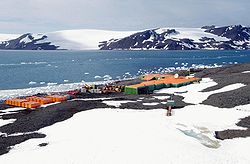Comandante Ferraz Brazilian Antarctic Base
|
Comandante Ferraz Antarctic Station Estação Antártica Comandante Ferraz |
|
|---|---|
| Research Station | |
 |
|
 Location of the station and its nearby shelters |
|
| Country |
|
| Territory | Brazilian Antarctica |
| Established | February 6, 1984 |
| Population | |
| • Total | 100 |
| Time zone | BRT (UTC-3) |
| Postal code | 20001-971 |
| Website | PROANTAR |
The Comandante Ferraz Antarctic Station (Portuguese: Estação Antártica Comandante Ferraz) is a permanent Antarctic research station named after the Brazilian Navy Commander Luís Antônio de Carvalho Ferraz, who visited Antarctica many times with the British exploration team and managed to convince his government to create a self-guided Brazilian Antarctic Program.
Located in Admiralty Bay, King George Island, near the tip of the Antarctic Peninsula, 130 km from the South American continent, the station began operating on 6 February 1984, brought to Antarctica in modules by the oceanographic ship Barão de Teffé (H-42) and several other Brazilian naval ships. It now houses about 60 people, including researchers, technicians and staff, military and civilians.
The station was named after Navy Commander Luís Antônio de Carvalho Ferraz, a hydrographer and oceanographer who visited Antarctica twice on board of British vessels. He was instrumental in persuading his country's government to develop an Antarctic program, and died suddenly in 1982 while representing Brazil at an oceanographic conference in Halifax.
The station was built on the same site of the old British "Base G", and the weathered wooden structures of the old base made a sharp contrast with the bright green and orange metal structures of the Brazilian station, which was first set up on 6 February 1984. Above the site of the base there is a small cemetery with five crosses: three of them are the graves of British Antarctic Survey (BAS) personnel; the fourth commemorates a BAS base leader lost at sea, and the fifth cross is the grave of a Brazilian radio operator sergeant who died of a heart attack in 1990.
...
Wikipedia
